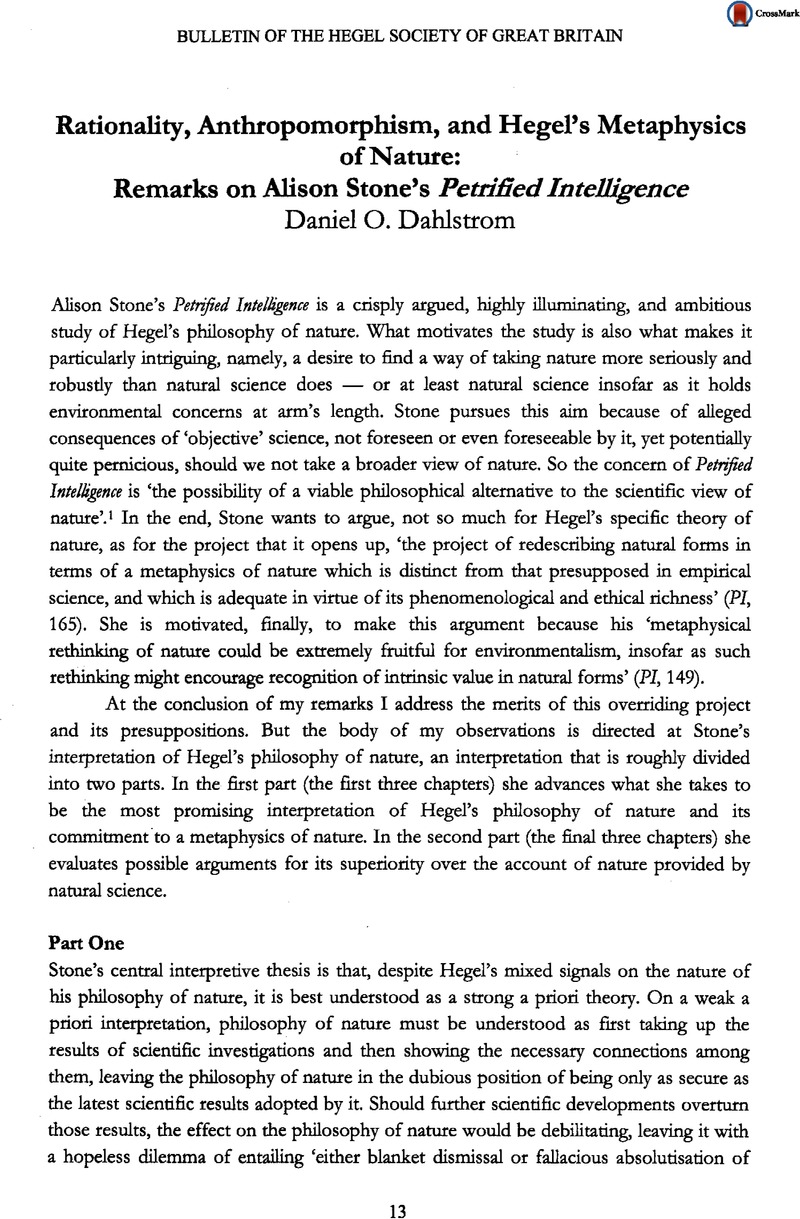Published online by Cambridge University Press: 23 June 2015

1 Stone, Alison, Petrified Intelligence: Nature in Hegel's Philosophy (Albany, New York: State University of New York Press, 2005), 84 (hereafter = PI)CrossRefGoogle Scholar.
2 PI, 27. I pass over Stone's very able discussion of John Burbidge's a posteriori reading which, despite its philosophical viability, renders Hegel's philosophy of nature even more precariously dependent on a particular stage of scientific development and thus underplays its metaphysical pretensions; see PI, 16–21.
3 PI, 76–80; see PI, 32: ‘Subsequently, Hegel equates these various stages with regions of nature as described by and theorised in natural science’. See also PI, 54. Stone assigns to the philosophy of nature the task of examining ‘how far natural forms that have been philosophically derived can be interpreted as identical to forms described by science’ (PI, 77); in this connection the operative term is ‘translation’ (PI, 77 et seq.).
4 This challenge presents itself quite clearly, for example, in the closing sentence of the Wissenschaft der Logik where the resolve of the pure idea to determine itself as nature is said to ‘posit for itself thereby only the mediation’ that leads to spirit Hegel, , Wissenschaft der Logik, zweiter Teil, hrsg. G. Lasson (Hamburg: Meiner, 1969), S. 506 Google Scholar.
5 PI, 36. Of course, we might find a way out if we concentrate on the philosophy of nature and do not take our bearings from the philosophy of mind. But, then, we would still need to find a way to take the externality in a manner that includes the concept of it, that is, the logical concept (in Hegel's systematic sense) or the scientific concept But including the concept in either sense is risky since the logical sense of the concept again raises the question of the integrity of the philosophy of nature, while the scientific sense would clearly undermine the strong apriorism.
6 PI, 40; see also PI, 42: ‘externality […] simultaneously wholly material and wholly conceptual’.
7 See PI, 58, where Stone seems to make an analogous point.
8 PI, 40, 79 et seq.
9 She considers four arguments: arguments (1) from explanatory power: the philosophy of nature is said to provide a better explanation of natural phenomena; (2) from systematic derivation: the philosophy of nature is uniquely true insofar as it follows from the metaphysics of the idea (these first two arguments are treated in Chapter Four); (3) from phenomenology of natural experience: the philosophy of nature is uniquely faithful to the basic form of the experience of nature (treated in Chapter Five); and (4) from ethics: the philosophy of nature uniquely recognises intrinsic value in all natural forms, deriving from their practical rationality (treated in Chapter Six).
10 PI, 121. In the discussion of these matters in Chapter Five, another issue that needs to be sorted out is that of the status of objects of sensible experience, objects of sensibility, and elemental qualities in relation to one another.
11 The issue raised here by Stone also entails the question of whether a theory of perception is necessarily also a theory of knowledge.
12 Remarks in the Conclusion (PI, 169) show her awareness of these issues.
13 PI, 72; see PI, 76 et seq. and PI, 68: ‘The basic difference between Hegel's and scientists’ metaphysical conceptions of universals, then, is that he explains the metamorphosis of universals by their intrinsic rationality, whereas scientists appeal to underlying laws’.